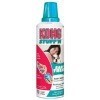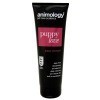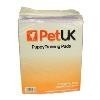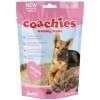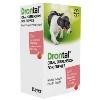Puppy Supplies

When deciding to buy Puppy Supplies, it is easy to forget about how much care they need. The average dog will live for up to 10 years or maybe longer and you will need to provide it with lots of companionship, regular meals and water and regular exercise taking it for walks 2 to 3 times per day - even in the middle of winter!
For the first week or so it is inevitable that your puppy will whimper and whine at night as a result of being stressed at its unfamiliar surroundings. You must resist the urge to comfort your puppy - it will soon tire and go to sleep naturally. The puppy’s stress could manifest itself with an upset stomach but this should not continue after a couple of days once the puppy has settled in.
With your new puppy comes a series of new responsibilities. It’s advisable to take your puppy to the vets during the first week to get it checked out. The vet will be able to arrange its vaccinations if it hasn’t already had them.
If you have children or other pets in your home, let your new puppy explore its new surroundings before making introductions. Introduce your puppy gradually and be there to watch. Make sure children don't treat the puppy like a toy, instead let the puppy explore your children and don’t let them pick it up too much. Teach children to respect the dog.
Feeding your puppy correctly is vitally important. A specially formulated growth food is recommended which needs to be fed at evenly spaced intervals to avoid over stretching their small stomachs. A responsible breeder will have given you advice about your puppy’s diet. Feed your puppy four meals a day up until the age of four months and then reduce its feed to three meals a day until it is six months old. Then you can change to two meals a day, and keep it on this regime for the rest of its life.
Your puppy will need a warm, comfortable bed, big enough to grow into and stretch out in and the bedding to go with it. It is advisable to get two sets of bedding so you can use one while washing and drying the other. You will need separate (non-tip) bowls for water and food. Make sure fresh water is always available for your puppy. When you first take a puppy home it is important to feed it on the same food it has been used to. A sudden change of diet combined with the stress of adapting to a new home can cause stomach upsets and diarrhoea. If you want to change the diet, do so gradually by mixing it in with the puppy’s usual food.
It is very important that your puppy has a range of appropriate toys to play with otherwise it might chew on your things instead of its own. Chew toys also provide mental stimulation, help to keep your dog’s teeth clean and allow it to exercise its jaws. Select the right toys for your puppy – make sure that they aren’t too small and can’t splinter.
Puppies need much less exercise than fully-grown dogs. If you over-exercise a growing puppy you can overtire it and damage its developing joints, causing early arthritis. A good rule of thumb is a ratio of five minutes exercise per month of age (up to twice a day) until the puppy is fully grown, i.e. 15 minutes when three months old, 20 minutes when four months old etc. Once they are fully grown, they can go out for much longer. It is important for puppies to explore new environments and to socialise with other dogs. But make sure your puppy is trained to recall so that you are confident that he will return to you when called. Remember that you should never exercise your dog on a full stomach as this can contribute to bloat.
You will need to consider a whole host of things you will need for your new puppy: A collar that is suitable for the breed, size and age of the puppy and that fits properly; an Identity Disc (it is required by law to have the name and address of the owner on the collar or on a plate or disc attached to it); Microchipping; a suitable lead; Poo bags; a car harness, travelling crate or dog guard; grooming equipment; doggy toothpaste and toothbrush; doggy shampoo and doggy treats for rewarding your puppy when training him.
If you are in doubt about any aspect to do with bringing up your puppy, do not be afraid to seek advice from friends or professionals. If you treat your puppy well, he will grow into a faithful companion for many happy years to come.
Disclaimer: The above article is not intended as a substitute for the advice of a veterinarian nor is the source to be used as a diagnostic tool as there may be various conditions that may resemble the descriptions provided.

